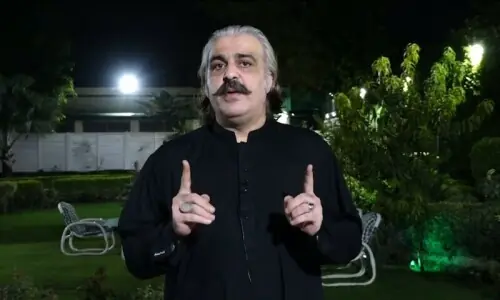ISLAMABAD: To break the deadlock over revival of $6 billion Extended Fund Facility, Pakistan and the International Monetary Fund have decided to show some flexibility in their stance on the issue of granting autonomy to the central bank, Dawn has learnt from knowledgeable sources.
Both sides began talks on Oct 4 through virtual interaction. The talks were scheduled to conclude by Oct 15 but continued until Oct 23. Since then, the IMF and Pakistan’s finance ministry have remained tight-lipped over the release of a memorandum of economic and financial policies (MEFP) — a report which carries Pakistan’s commitment to specific time-bound targets.
Informed sources told Dawn that the IMF was not happy with Islamabad’s position to backtrack on its commitment to granting autonomy to the State Bank of Pakistan (SBP). In March 2021, Pakistan reached an agreement with the Fund on granting autonomy to the central bank, which was also approved by the IMF board.
Pakistan’s economic team led by Adviser to the Prime Minister on Finance and Revenue Shaukat Tarin has had several rounds of talks with the Fund officials to apprise them of numerical strength of the ruling Pakistan Tehreek-i-Insaf in the lower and upper houses of parliament where the Constitution will be required to be amended to grant autonomy to the SBP.
During the course of negotiations, the IMF was informed that the proposed autonomy needed constitutional amendments, which required two-thirds majority in both houses. Interestingly, the need for amendments was either not realised or overlooked when the Pakistani team agreed to grant autonomy to the SBP.
Constitution needs to be amended for bringing any change to SBP status
On March 9, the federal cabinet cleared a bill which was aimed at providing greater autonomy to the central bank over price control and fighting inflation. Autonomy was also linked with adopting exchange rates and monetary policy in an autonomous manner without the government’s interventions. Under the proposed law, no one will question decisions of top officials of the SBP.
Soon after the decision, two leading opposition parties — the Pakistan Muslim League-Nawaz and the Pakistan People Party — announced that they would block the passage of the bill in parliament.
Read: 'Will not allow this': PML-N blasts proposed bill on SBP autonomy
As a result of these negotiations, the sources said the IMF had now shown some flexibility and talks continued on the draft amendments related to the SBP. “The finance ministry has shared revised proposed amendments on the SBP with the Fund,” the sources said.
According to the sources, these amendments will now be reviewed by the Fund officials who will give their response early next week. The finance ministry is hopeful that the amendments will break the deadlock and pave way for finalisation of the much-awaited review for the release of next tranche, according to the sources.
These amendments are related to four to five areas in the State Bank Act. The negotiations on the draft amendments are continuing and are expected to finalise early next week. The MEFP will be released as soon as talks are completed.
Meanwhile, Pakistan and the IMF have finalised their commitments on the fiscal side.
Pakistan held out an assurance to the Fund in March that it will withdraw tax exemptions mostly related to sales tax.
“The withdrawal of these exemptions is limited to non-essential or luxury items in the list which entails 250 to 300 items,” the sources said.
Mr Tarin has also hinted at bridging the gap of Rs450 billion in revenue the government had given up on petroleum products from rationalisation of taxes. However, he was not willing to disclose details in his last press conference.
Under the IMF program, IMF concern is only with primary account – the difference between revenues and expenditures excluding debt servicing. Mr Tarin is optimistic about the primary balance remaining in surplus, which is the only concern of the IMF.
Meanwhile, in the absence of revival of the IMF package, Saudi Arabia has approved a financial package in the form of $3bn in safe deposit and $1.2bn worth of petroleum products supplies on deferred payments.
Published in Dawn, October 31st, 2021

































